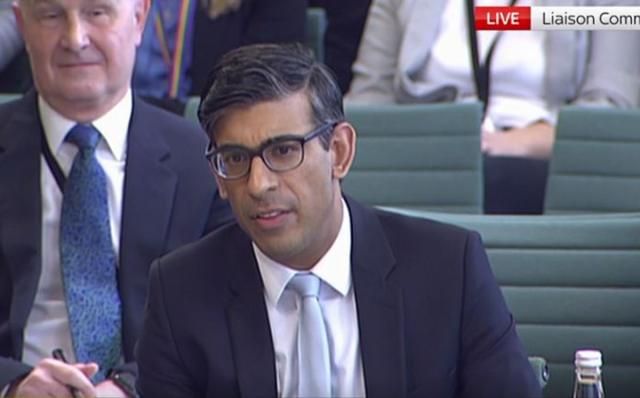The remarkable thing about today’s Liaison Committee is how unremarkable it was. During the ninety-minute session with the chairmen of the House of Commons’ select committees, the contrast with Boris Johnson’s box office battles could not have been clearer. Sunak sought to conciliate, downplay and comfort at every turn, seeking to offer warm words and switching his focus between the macro and the micro: matching MPs on specifics to assure them he was across the detail while taking difficult questions back to his first principles.
Child refugees? We have to stop the boats. If Northern Ireland is in the single market, why not Scotland? The 2014 vote remains in force. NHS pay? There will be funds – but we must halve inflation. It represented the wider approach which Sunak and Starmer are taking to politics in seeking a return to normalcy. Most of the Labour chairmen demanded more funding; most of the Tories asked technical questions. It’s the kind of setting which Sunak excels in – as evidenced by the frustration of some watching journalists at the dearth of real news lines.
The often technocratic discussions couldn’t have been further from the paroxysms of rage which Boris Johnson used to induce when facing such engagements and was if, anything, more low-key than Sunak’s first session back in December. That is a reflection of two things. First, Sunak’s decision to take such set-piece events seriously and demonstrate that he has ‘done his homework’.
But it also suggests that the select committee chairmen are also adopting a much less adversarial approach. A case in point was Sunak’s polite chat with Simon Hoare, one of Boris Johnson’s most vocal critics. The Northern Ireland Affairs chairman thanked Sunak for the Windsor Framework while neglecting to mention MI5 today upgrading the likelihood of a terror attack there. Similarly, Bernard Jenkin appeared to be in a much more emollient mood than he was at last week’s Privileges Committee meeting.
Still, we did learn some things from today’s Liaison Committee – other than the Prime Minister’s adeptness at presenting his controversial migration proposals as the epitome of good sense. Below are four takeaways from today’s session in parliament:
The PM’s message to China
Ukraine was one of the first subjects of the day. Sunak said that ‘I would not necessarily see it as a negative’ that UK missile stocks to Kyiv have been depleted, as ‘they were ultimately there to degrade and deter – primarily – Russian aggression. They are being used to do exactly that, they are just being used by the Ukrainians’. He pointed out that the government has increased defence spending by £5 billion and provided President Zelenskyy’s men with support worth £2.3 billion last year.
He also was asked about Beijing’s peace plan and said that he was glad that China claims to be supporting Ukraine’s territorial integrity. However he added that it was ‘clear that Russia is dependent on China’ after Xi and Putin met in Moscow and that Beijing’s decision to abstain in a UN vote demanding Russia withdraw troops from Ukraine ‘does little for their credibility as a neutral party in this’.
Rwanda scheme difficulties
Diana Johnson, chair of the Home Affairs committee, proved to be one of the more effective interrogators today, politely grilling Sunak on his efforts to offshore migrant processing. She repeatedly asked the Prime Minister about whether or not the Home Office’s top civil servant has signed off the Rwanda policy as value for money; Priti Patel issued a ministerial direction to get it over the line in April last year. Sunak ducked the question, suggesting it has still not been signed off. He also demurred when it was claimed that flights to Rwanda carrying illegal migrants will take off by the summer – having told journalists at the beginning of the month that flights ‘could be’ as soon as then. Sunak told the committee that ‘no one has promised flights by the summer, what we’ve said is we will start flights as soon as we can after legal proceedings have been completed.’
HS2 will reach Euston
One area where Sunak was willing to overrule newspaper reports was on the question of whether HS2 will go to and terminate at Euston. He told Iain Stewart, the chair of the Transport select committee that ‘it shouldn’t be ambiguous’ that it will go ahead, in a mild rebuke to Michael Gove, who said on Sunday that this could not be guaranteed. Sunak added that ‘the aim is to deliver that station alongside the rollout to Manchester and to take the time now to get the right deliverability for that particular section’.
Sunak’s own vulnerabilties
Suank didn’t have many tricky moments at a particularly low-energy session but two stood out. The first was about childcare, when Cat McKinnell pointed out that under Jeremy Hunt’s new Budget scheme, six private childcare providers will be getting taxpayer funding – double the rate of individual childminders. McKinnell asked Sunak if he wished to declare an interest; it was left to Paul Waugh from the i newspaper to point out that Sunak’s wife reportedly has direct shareholdings in a business that runs Koru Kids, one of the providers which stands to benefit. It was a reminder that Sunak’s extensive family wealth has the potential to be a political liability for the Prime Minister.
The second difficult moment for Sunak came when Diana Johnnson asked about Suella Braverman’s use of language. She noted that the Home Secretary disagreed last week with Dame Louise Casey’s verdict that the Met Police is ‘institutionally racist’ and called it ‘an ambiguous, contested and politically charged term.’ But as Johnson pointed out, Braverman has had no such qualms using the term ‘invasion’ to describe arriving migrants. How, she asked, can one phrase be politically ‘charged’ but not the other? Sunak deflected but looked uncomfortable, in an exchange which highlighted another running theme of his premiership: being held accountable for others’ deeds and words.







Comments